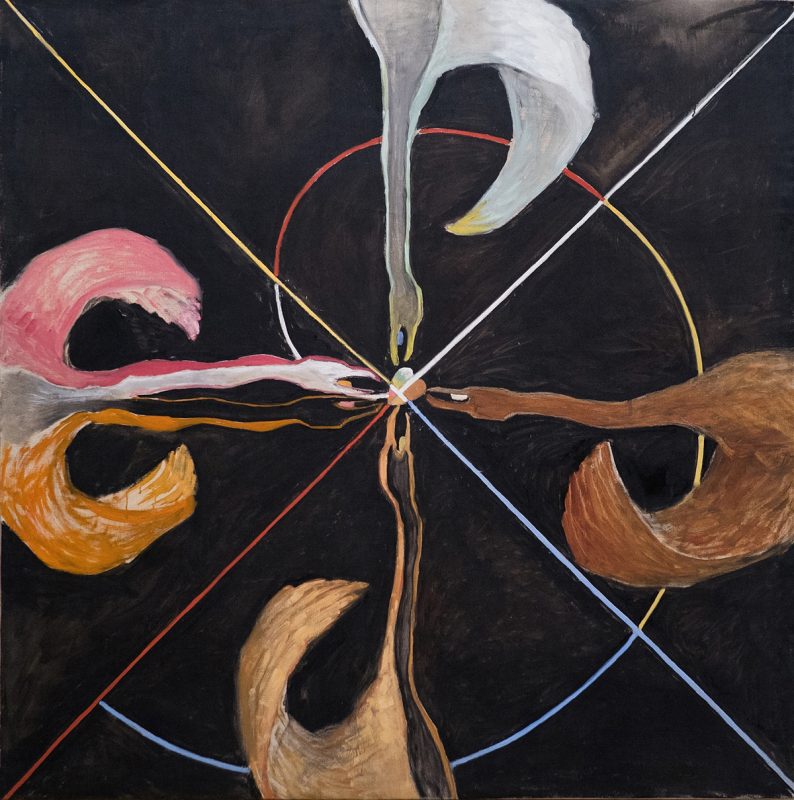Beyond Memory
기억의 저편
circle 동글이
August 12, 2023
Hilma af Klint, Group IX SUW, The Swan No. 7, 1915

Hilma af Klint, Group IX SUW, The Swan No. 7, 1915
At the beginning of Proust’s monumental work, In Search of Lost Time, there is an episode where a single bite of a madeleine dipped in tea triggers a flood of memories. This moment, often referred to as the “Proustian effect,” is familiar even to those who haven’t read the book, as it vividly illustrates how scent can evoke memories. In this way, scent doesn’t just linger at the tip of our noses before disappearing—it is closely tied to human memory, and it does this in the blink of an eye. A scent can easily and swiftly retrieve fragments of memories buried deep in our brains, even those we didn’t consciously try to remember from long ago, perhaps from childhood. We often struggle to recall what a friend told us just yesterday—but scent has a stronger pull. And it doesn’t stop at simply reminding us of a specific moment or scene from the past. It also conjures up the emotions and intangible feelings that were tied to that time.
This experience is entirely personal. When I smell frankincense, I’m reminded of entering a cathedral in Europe. I can feel my heart race once again, just like on that day, as I stood in awe, listening to the majestic sound of the Mass echoing through the grand, towering Gothic architecture. If I catch the scent of birch or juniper, I’m taken back to summer camping trips, watching the campfire my dad built flicker in the dark. I remember the anticipation as we waited for the sweet potatoes to cook, the warmth of sitting around the fire, and the joy of sharing stories with my family. This is how I relive the feelings and atmosphere of those moments through scent. However, someone else might smell birch and be reminded of the devastating aftermath of a fire, or catch a whiff of juniper and recall a crisp morning in the forest. The reason people perceive and distinguish scents differently is because their experiences—their memories—are different. (This ties back to what I discussed before.)
However, while these phenomena occur, the way various organs in the human body operate remains the same for everyone. Most senses, such as sight and hearing, are processed through the thalamus before being transmitted to the cerebral cortex, where they are perceived as “sensations.” But smell is different. When a scent binds to the olfactory receptors, it immediately generates an electrical signal that travels directly to the olfactory bulb, like an express delivery straight from the source. This direct path allows the scent to reach the amygdala and hippocampus—parts of the brain responsible for emotion and episodic memory—without delay. This is why smell is often considered the most primitive or “first” sense. While the emotional memories evoked by scent are often seen as romantic, in reality, this is a natural and scientific process.
Additionally, scent travels through the limbic system to reach the hypothalamus and pituitary gland, which regulate the autonomic nervous system, immunity, and hormones. Using this scientific basis, aromatherapists have conducted various clinical experiments to demonstrate that plant fragrances can influence human emotions and stimulate the autonomic nervous system, leading to physical reactions. In particular, several studies have focused on the connection between smell and memory, noting that one of the early symptoms of Alzheimer’s disease—a difficult-to-treat illness—is the loss of smell. Currently, in countries like the United States and Japan, olfactory testing kits are being used to help detect Alzheimer’s early, and recently, news has surfaced about the development of olfactory kits in Korea, using scents that are culturally familiar. The idea that scent can not only evoke personal memories but also aid in the research and treatment of diseases is gaining traction.
The ability to recall the past, whether through good memories or bad, is a remarkable aspect of being human. The fact that this ability can be enhanced through the sense of smell means that scent is not merely something fleeting or intangible, confined to the realm of personal taste. Instead, it allows us to bring vitality to life through a more active sensory experience. A fragrance can help instantly transform stress-filled emotions into feelings of calm, turn a melancholic mood into memories of happier times, or shift lethargy into a moment of focused energy. Working with scent is like traveling through time, delicately managing emotions with a sensory skill that is both intricate and complex.

프루스트의 방대한 여정, <잃어버린 시간을 찾아서>에 보면 홍차에 적신 마들렌을 한입 베어 무는 순간에 기억을 환기하는 에피소드가 있다. 책을 읽지 않은 사람에게도 익숙한 이른바 ‘프루스트 효과’로, 향기가 기억을 이끌어내는 순간을 묘사한 것이다. 이렇듯 향기는 코끝에 머물다가 사라지는 것이 아니다. 향기는 인간의 기억과 연결된다. 그것도 너무나 짧은 순간에 말이다. 냄새는 아주 오래 전, 어릴 적 추억의 저편에 묻어둔, 기억하려고 하지 않았던 뇌 속의 조각까지 거슬러 올라가는 일을 너무나 쉽고 빠르게 해낸다. 어제 들었던 친구의 이야기도 가물가물할 때가 있을 정도로 인간의 기억력은 연약한데, 냄새는 그것보다 강하다. 특히 단순히 과거의 특정한 순간이나 상황의 모습을 떠오르게 하는 것에 그치지 않는다. 그 속에 자리잡았던 그날의 감정, 무형의 기억을 함께 소환한다.
이는 순전히 개인적인 차원의 경험이다. 나는 프랑킨센스를 태우는 향기를 맡으면 유럽의 한 성당에 들어갔던 순간이 떠오른다. 화려하고 높은 고딕 건물 안에서 울려 퍼지는 장엄한 미사곡에 내 마음이 울렁거리던 그날의 감정에 다시 심장이 두근거린다. 어디선가 자작나무나 두송나무의 냄새가 나면 어릴 적 여름 캠핑에서 아빠가 태우던 모닥불의 펄럭거리던 모습이 연상된다. 고구마가 익기를 기다리던 시간과 설레던 기분, 둘러 앉아 이야기 꽃을 피우던 가족들과의 따뜻했던 감정이 몽글몽글하게 피어오른다. 냄새가 전해주는 그날의 느낌과 분위기를 나는 이런 방식으로 느낀다. 그러나 다른 사람들의 프랑킨센스는 나와 같지 않을 것이다. 자작나무의 냄새와 침향나무의 냄새에서 같은 것을 느끼는 사람도 있을 것이다. 사람마다 감각을 촘촘히 받아들이고 구분하는 능력이 다른 것은 그가 가지고 있는 경험, 즉 기억이 다르기 때문이다. (이는 지난 번에 이야기한 내용과 연결된다.)
하지만 이러한 현상이 일어나는 동안 인체의 각 기관이 작동하는 원리는 어떤 인간이라도 동일하다. 시각이나 청각 등 대부분의 감각은 뇌의 시상으로 전달되었다가 대뇌신피질로 들어가서 ‘감각’으로 느껴지는 과정을 거친다. 하지만 그 중 후각, 즉 ‘냄새’는 후각수용체에서 결합하며 즉각 전기적 신호를 발생시켜서 마치 산지직송 택배처럼 후각신경구로 전달된다. 그리고 이렇게 직행한 냄새는 각각 감정과 일화 기억을 관장하는 편도체와 해마(변연계)까지 닿는다. 때문에 후각을 가장 원시적인 감각 혹은 제1의 감각으로 이야기하기도 한다. 냄새로 떠오르는 기억이 그때의 감정을 동반하는 일은 보통 낭만의 차원에서 받아들여지지만, 사실은 너무나 자연스럽고 과학적인 흐름인 것이다.
한편 냄새는 변연계를 거쳐 자율신경, 면역, 호르몬을 관장하는 뇌의 시상하부와 뇌하수체까지 도달한다. 그리고 이러한 특성을 과학적 기반으로 삼아 아로마테라피스트들은 다양한 임상 실험을 통해 식물의 향기가 인간의 감정을 컨트롤하고 자율신경계를 자극하여 신체적 반응을 일으킨다는 점을 밝혀내려고 하고 있다. 특히 기억과 관련해서 난치병으로 알려진 알츠하이머의 초기 증상 중 하나가 후각 상실이라는 점에 주목하는 일련의 실험이 활발히 진행중이다. 현재 미국, 일본 등에서는 후각검사 키트를 알츠하이머의 조기 발견에 활용하기도 하며, 최근 국내에서도 우리 문화에 알맞은 향으로 구성한 후각 키트를 개발했다는 소식이 있다. 상실된 기억을 되살리는 일을 하는 냄새가 개인적인 경험의 차원을 넘어 질병을 연구하고 정복하는 데에도 활용되고 있다. 좋은 기억이든 나쁜 기억이든 과거를 떠올릴 수 있는 인간의 능력은 그 자체로 멋진 일이다. 그리고 후각을 통해 그러한 능력을 보완할 수 있다는 점은 단순히 향기를 덧없고 비가시적인 취향의 영역에 가두지 않고, 좀 더 적극적인 감각 경험을 통해 삶의 에너지를 꾸려갈 수 있음을 의미한다. 일상의 스트레스로 가득 찬 감정을 순식간에 편안함으로 채울 수도, 울적한 기분을 행복한 시간의 기억으로 변화시킬 수도, 늘어진 감정을 집중할 수 있는 변화의 순간으로 바꿀 수도 있는 향기. 향기를 다루는 일은 매 순간 시간 여행을 하며 감정을 다루는 섬세하고 복잡한 감각의 기술이다.

